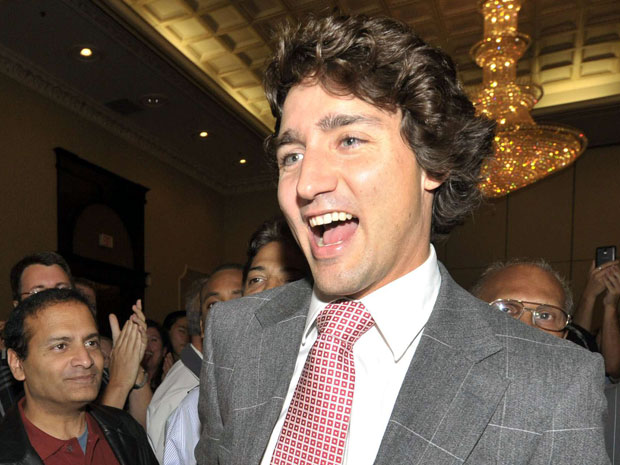
Poll: Liberals win Majority if Trudeau is Leader
Since the defeat of Paul Martin’s Liberal Minority Government in 2006 by Stephen Harper’s Conservatives, the news has only gotten worse, and worse, and worse for the Liberal Party of Canada. The once mighty party was reduced to third party status last year after repeated hits, losses and unfavorable conditions. However, there is a glimmer of hope at the horizon. As the Liberals grow and rebuild, a new Forum poll for The National Post shows, in favor of other polls that have been conducted, that star candidate Justin Trudeau can take them back to the top if he becomes their leader.
The poll found that if Trudeau were the leader, the Liberals would win a 160 seat majority government with 39% of the vote. The Conservatives would be left as the Official Opposition with 104 seats at 29% of the vote. The NDP would be reduced to a bit more than what they used to be, 42 seats with 24% of the vote. The Bloc Quebecois, Greens and other parties would share the remaining 8% of votes and this would only yield one seat for the bloc Quebecois. The survey was conducted on October 27 and called 1,735 random people that are eligible to vote.
The same poll found that current interim leader Bob Rae would have faired poorly had he thrown his name into the hat. If Bob Rae would have entered the race and won and lead the Liberals into an election, the Liberals would remain in third place with only 76 seats.
In terms of regional voting, Trudeau faired best in Ontario, Quebec, and Atlantic Canada. One poll suggests that Trudeau would actually bring the biggest Liberal seat count from Quebec since when his father was Prime Minister.
“Interestingly, the Bloc Québécois take more seats if Justin Trudeau is NOT leader [eight seats] than they do if he is [one seat],” noted Forum research.
Meanwhile, British Columbia and much of the west remain a battle ground for the NDP and Conservatives.
“The ‘Trudeau Effect’ has proven itself as a real phenomenon, and it appears to be growing, not going away,” said Forum Research president Lorne Bozinoff.
This poll agrees with other polls that have been conducted long before Trudeau even announced his bid. On September 28, 4 days before Trudeau jumped in, another Forum poll predicted that Trudeau would destroy the NDP.
A CROP poll last week suggested that in Quebec, the Liberals could pull ahead of the NDP with 36% support, leaving the Bloc Quebecois in disarray.
Over the past 6 years, the Liberal Party of Canada took a beating. As the Conservatives boxed them into a corner, every election defeat brought about a new leader and another defeat. The main headlines in the news outlined perceived weaknesses and polls that favored Conservative wins, incremental in size.
Last year the Liberals roughly halved their 2008 seat count and lost Official Opposition status. With Conservative legislative motions designed to act as landmines, Conservative strategists gambled on election fatigue and pessimistic media outlooks for the Liberals and succeeded. The Conservatives’ labeling motions as Confidence motions forced the Liberals to abstain or vote with them. A vote against a confidence motion – which would have been secured by the NDP and Bloc Quebecois who repeatedly objected to Conservative legislation, would have caused the writ to fall and another election to commence.
With another possible election, the Liberals stood to lose as polls incrementally favored the status quo and the electorate grew impatient and apathetic. So what were Liberal strategists to do? Force an election and lose more seats to the Conservatives or swallow the poison pill and sit on their hands? Clearly they chose the latter and while they kept seats this way, it gave the NDP and Conservatives plenty of ammunition.
A Liberal Party with its hands tied will inevitably appear weak and inevitably be labeled weak – as it was by the Conservatives. A Liberal Party that passes legislation with the Conservatives is not considered change, it is considered “more of the same” which gave the NDP momentum to come in and claim to be a better opposition party and most importantly, an alternative to the Conservatives. Add leaders that didn’t resonate well and we see a grim picture for the Liberals. The Conservatives got their coveted majority and the NDP made inroads with the majority of Canadians that simply didn’t support the Conservatives.
However, support for the Liberal Party is starting to rebound and polls suggest a Trudeau-led party would bring the Liberals back to power.
While the Forum poll suggests that Trudeau’s majority would be a slim 160 seats, he will have gotten that single-handedly whereas Harper’s Conservatives needed two minority mandates and 5 years to get 166 seats. Note that in both cases there is discontent. In 2006, Canadians voted for change because they were tired of the Martin Liberals and were angry at the controversies spiraling around the sponsorship scandal. Now, we have a Harper-led Conservative government that is seemingly losing support and let’s not forget that the Conservatives have had a good number of scandals of their own that measure up or surpass the sponsorship scandal.
For any Liberal out there, this is the best news they’ve had in over 6 years. As for the NDP, this may be the worst news they will receive and as for the Conservatives… the train can only roll so long before it needs to make a stop for gas.
A poll can only say so much, but it is always fun in politics to speculate and try to forecast election possibilities. Now it’s your turn, what do you think will happen if Trudeau wins the Liberal leadership race?



